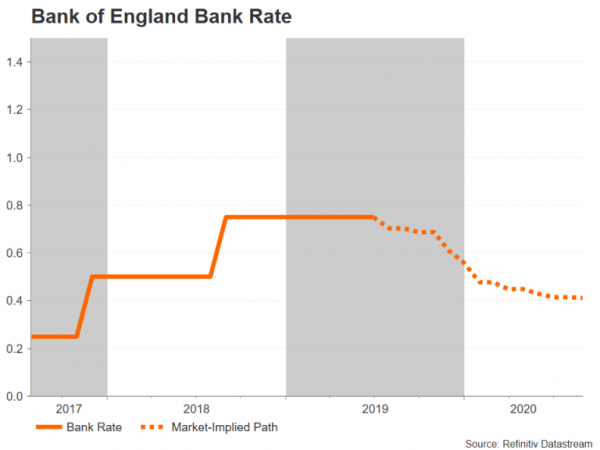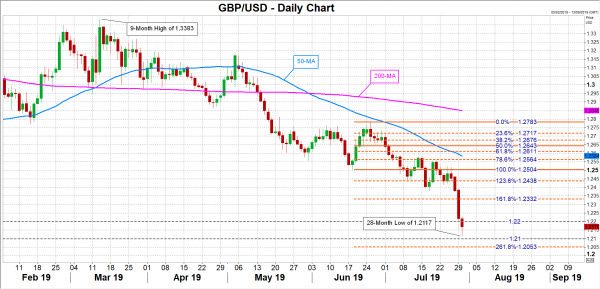The Bank of England will announce its latest policy decision on Thursday at 11:00 GMT and will also publish its quarterly inflation report, followed by a press conference with Governor Mark Carney at 11:30 GMT. Markets are anticipating the Bank to strike a more dovish tone but whether this will involve signalling a rate cut is far from clear. What is certain, however, is that the meeting is unlikely to halt sterling’s slide, which is under pressure from the growing risk of a disorderly Brexit.
BoE unlikely to follow Fed and ECB in cutting rates
With the US Federal Reserve poised to cut rates this week and the European Central Bank widely expected to follow suit in September, the Bank of England remains one of the few major central banks that has not signalled some form of policy easing. The BoE has so far stood by its prediction that interest rates will need to rise by a limited and gradual extent over the next 2-3 years if there is a smooth UK exit from the European Union.
But as a no-deal Brexit increasingly becomes a realistic prospect under a Boris Johnson government and the outlook for the world economy darkens, BoE policymakers have only talked of the growing downside risks without committing to any policy response measures. This means the most likely outcome is for the BoE to adopt a more neutral stance on Thursday as it leaves the Bank Rate unchanged at 0.75%.
No change in policy expected; forecasts in focus
With the Brexit deadline just three months away, investors are in one mind that all the Bank can do until then is stay on hold as Prime Minister Johnson plays hardball with the EU. The Monetary Policy Committee’s (MPC) biggest challenge will instead be on its communication as it attempts to provide credible forecasts using a baseline scenario that Britain will leave the EU with a deal on October 31.
Those forecasts are due to be updated on Thursday in the August Inflation Report and Carney has hinted at possible changes to how the projections will be calculated. As markets are increasingly pricing a higher chance of a no-deal Brexit, the market-implied path of the Bank Rate, which the BoE uses in its own prediction, has shifted to point to a full 25 basis points cut by March 2020.
If the MPC was to stick with its assumption of a smooth Brexit, then by its own calculations, it would overshoot its 2% inflation target if rates were cut over the next year. So policymakers need to come up with a way to incorporate the Brexit risk into their projections without changing the assumption of an orderly Brexit.
BoE policy may have little impact on pound
But while the Bank’s credibility is at stake at how the Institution manages its communication and forecasting in the lead up to the Brexit deadline, the impact on the markets might be more minimal given that economic data and monetary policy have become secondary to politics since the 2016 referendum.
The pound has been plunging this week, crashing below the $1.22 level for the first time since 2017. If the Bank surprises and takes a much grimmer view of the British economy than investors are anticipating, the $1.21 mark could become an easy target for the bears. Sharper losses are likely if the MPC goes one step further and flags a possible rate cut. This could open the way for the 261.8% Fibonacci extension of the June upleg at $1.2053.
On the other hand, if the Bank sticks to its existing forecasts that some tightening will be needed over the coming period, the pound could find some support from its recent declines and stabilise near the $1.22 handle.
Outlook clouded by new Johnson government
One factor that could prevent the MPC from adopting a more dovish view is the new spending plans by Johnson. The new PM has pledged millions on transport, policing and farming, which has fuelled speculation of a snap election. If a general election is called in the coming weeks, this would further complicate the decision making for the BoE by adding to the cloud of uncertainty over the UK’s economic outlook.


